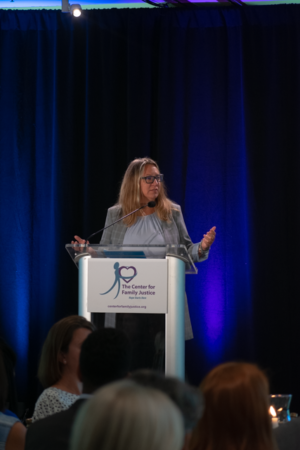Center for Family Justice hosts 25th annual Speaking of Women event

The Center for Family Justice, a Bridgeport-based nonprofit focused on providing free, confidential services for people impacted by domestic violence, sexual violence and child physical and sexual abuse, recently hosted its 25th annual Speaking of Women event that serves as a fundraiser and an opportunity to honor those who contributed its mission as volunteers, donors, and participants.
Debra Greenwood, the center’s president and CEO, opened the event by noting demand for the organization’s services increased by 32% in 2021.
“Unfortunately, business is good,”she said, glumly.
To help meet the needs of the organization’s efforts to help those impacted by domestic violence, the center held a raffle and fundraising campaign over the course of the luncheon, along with a silent auction. Prizes ranged from diamond jewelry to the latest Apple electronics. The event also marked the launch of a new video promoting Camp HOPE, which provides children ages 7 to 17 with a healing environment to recover from domestic violence-induced trauma.
Originally, the keynote speaker was slated to be author and activist Stephanie Land, whose book “Maid: Hard Work, Low Pay, and a Mother’s Will to Survive”served as the basis for the Netflix series “Maid.”However, Land suffered a leg injury that prevented her from traveling to the event, and her friend and fellow author, investigative journalist Rachel Louise Snyder, took her place.
Snyder’s latest book, “No Visible Bruises: What We Don’t Know About Domestic Violence Can Kill Us,”deals with the ways that domestic violence is a factor in many other societal ills, ranging from mass shootings to homelessness and poverty. The inspiration for the book, Snyder explained, came as a result of a chance meeting with the sister of a friend shortly after she returned from a posting to Cambodia as a correspondent for NPR. The sister turned out to work for a women’s shelter working on developing a system for predicting and eliminating instances of domestic violence, and this set Snyder on an investigative course that caused her to rethink everything she thought she knew about domestic violence.
Snyder then told the crowd the story of a woman she called “Michelle”from Montana who was repeatedly failed by both formal and informal systems as she attempted to extricate herself from a relationship with an abusive man who ultimately murdered her and their children before killing himself.
Snyder highlighted the ways that bureaucratic systems ranging from banking regulations to a District Attorney whose chief focus was on winning cases let Michelle slip through the cracks, and she was not shy about reminding her audience that they can play a part in fixing those issues.
“How easy is it to get your ex’s name off of an account without interacting with them at all?”Snyder asked the audience. She also asked the law enforcement officers present to consider what they would have done differently from the police in Michelle’s story, urging them to pay attention to red flags for domestic violence.
Snyder closed by calling for those gathered to face their own ignorance as she found herself forced to.
“I learned that I was part of a system that was getting it wrong,”she said. “I’m a journalist, I don’t consider myself an advocate. I consider myself a journalist and I’m part of the media system that wasn’t telling the story of domestic violence correctly. My book is an attempt to change that, because we need to know what victims can’t say. We need to know how to put the plot together and form the larger story. It’s up to us to understand this.”